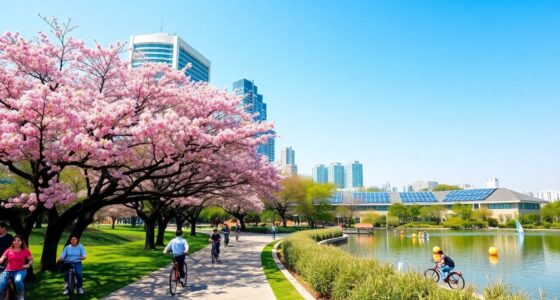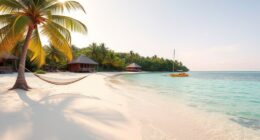You can now explore the Greek Cyclades using zero-emission ferries powered by renewable energy, making island hopping more eco-friendly. These sustainable vessels use advanced technologies like hydrogen fuel cells and batteries, reducing pollution and protecting marine life. This shift benefits both tourists and locals by preserving natural beauty and promoting responsible tourism. To discover how Greece is expanding this innovative transport network and what it means for your trip, keep exploring further.
Key Takeaways
- Greece is investing in renewable energy-powered ferries, including hydrogen and battery electric vessels, to promote zero-emission island hopping.
- Infrastructure upgrades like charging stations and renewable energy integration support sustainable maritime routes across the Cyclades.
- Eco-friendly ferries reduce pollution, protect marine ecosystems, and promote responsible tourism in the Greek islands.
- Government incentives and technological innovations enhance the adoption of zero-emission vessels in the region.
- Transitioning to sustainable transport helps Greece position itself as a leader in eco-conscious maritime travel.
The Shift Toward Sustainable Marine Travel in the Cyclades
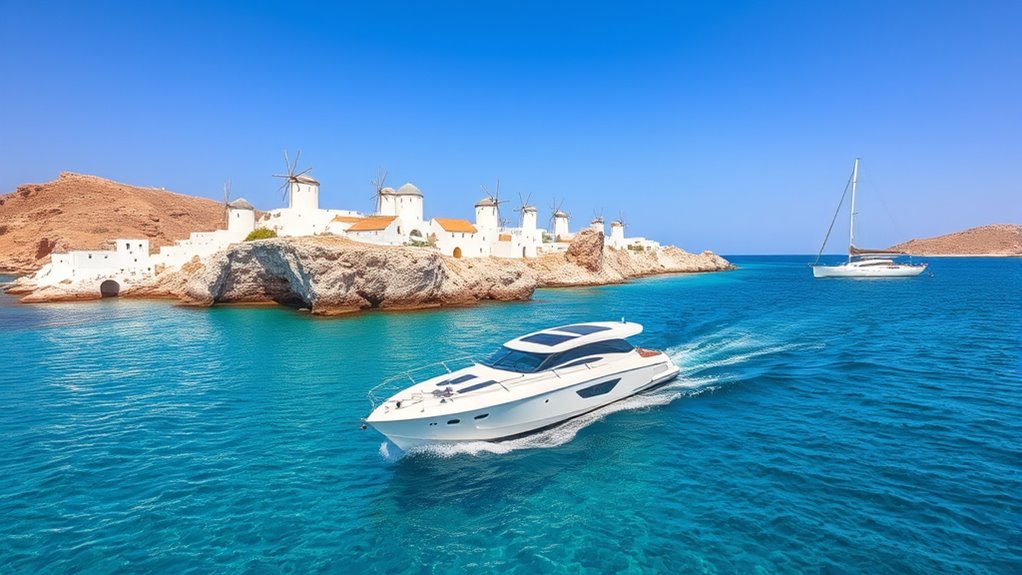
As concerns about climate change grow, the Cyclades are increasingly embracing sustainable marine travel. You’ll notice efforts to incorporate renewable energy sources, such as solar and wind, into ferry operations, reducing reliance on fossil fuels. This shift not only cuts emissions but also supports marine conservation by decreasing pollution and preserving local ecosystems. Local authorities and operators are investing in eco-friendly technologies, making island hopping more environmentally responsible. By choosing routes powered by renewable energy, you help promote a cleaner, greener future for these beautiful islands. Your travel choices contribute directly to protecting the Cyclades’ marine biodiversity, ensuring that stunning coastlines and vibrant underwater life thrive for generations to come. This movement signifies a real commitment to sustainable, responsible tourism.
Types of Zero-Emission Vessels and Technologies Used
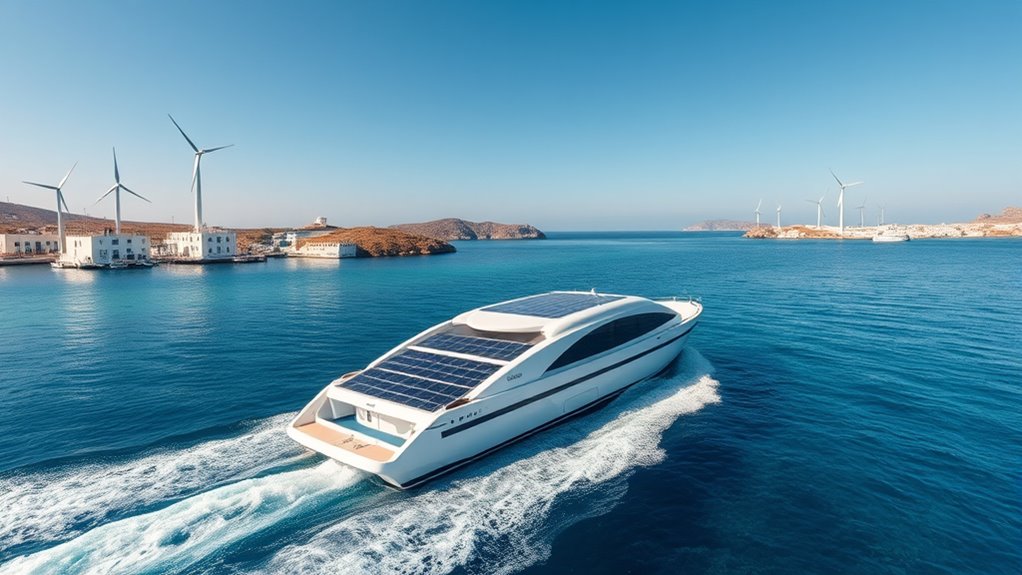
Zero-emission vessels are transforming maritime travel by utilizing innovative technologies that eliminate or drastically reduce environmental impact. Among these, hydrogen ferries stand out, using hydrogen fuel cells to produce electricity, emitting only water vapor. They offer a clean alternative for short and medium routes, making them ideal for island hopping. Battery-powered vessels are another key type, relying on large onboard batteries charged from renewable sources. These vessels operate quietly and efficiently, with zero emissions during trips. Both hydrogen ferries and battery-powered vessels leverage advances in energy storage and fuel cell technology, making them practical options for sustainable transportation. Their adoption signals a shift toward greener maritime practices, helping you reduce your carbon footprint while enjoying scenic island journeys. Utilize vertical storage solutions to optimize space onboard and enhance overall efficiency. Additionally, ongoing innovations in energy management systems are further improving the viability and performance of zero-emission vessels, ensuring their role in the future of eco-friendly maritime travel. Implementing renewable energy sources for onboard power generation is also contributing to the sustainability of these vessels. Furthermore, integrating a variety of sustainable propulsion methods continues to expand the capabilities and efficiency of zero-emission maritime vessels. As technology progresses, energy efficiency measures are becoming increasingly vital in maximizing the environmental benefits of these vessels.
Benefits of Eco-Friendly Island Hopping for Tourists and Locals
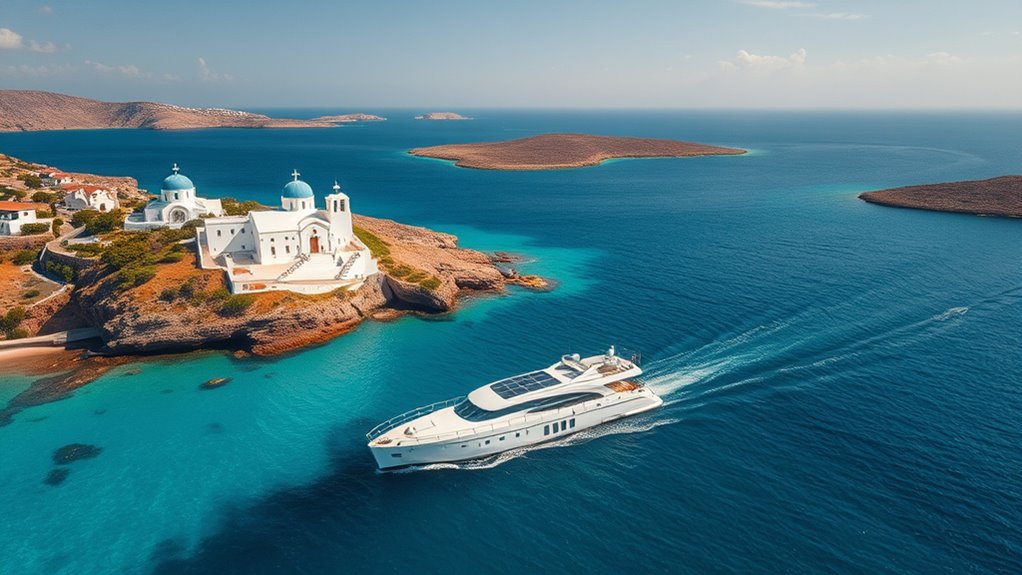
Choosing eco-friendly island hopping benefits both tourists and locals by protecting the environment and enhancing the overall experience. When you opt for sustainable transport, marine conservation becomes a priority, helping to preserve the vibrant ecosystems that surround the Greek Cyclades. This approach reduces pollution, safeguards marine life, and maintains the natural beauty that draws visitors. Additionally, eco-friendly travel supports cultural preservation by minimizing environmental impact on local communities and their traditions. As a result, you enjoy more authentic, immersive experiences while respecting the islands’ heritage. Green practices foster a sense of shared responsibility, ensuring these islands remain pristine for future generations. Incorporating pressure relief solutions like eco-conscious boats can further minimize environmental impact and promote sustainable tourism. Implementing eco-friendly materials in boat construction can also significantly reduce pollution and resource depletion. Using cold-pressed vegetable juice techniques as an analogy, sustainable boat design retains more environmental benefits and nutrients, akin to maintaining the islands’ natural vitality. Promoting eco-tourism initiatives can elevate awareness and support responsible travel practices among visitors. Ultimately, eco-friendly island hopping creates a win-win situation: you get to explore responsibly while helping protect the environment and local culture.
Challenges and Opportunities in Implementing Green Ferry Systems
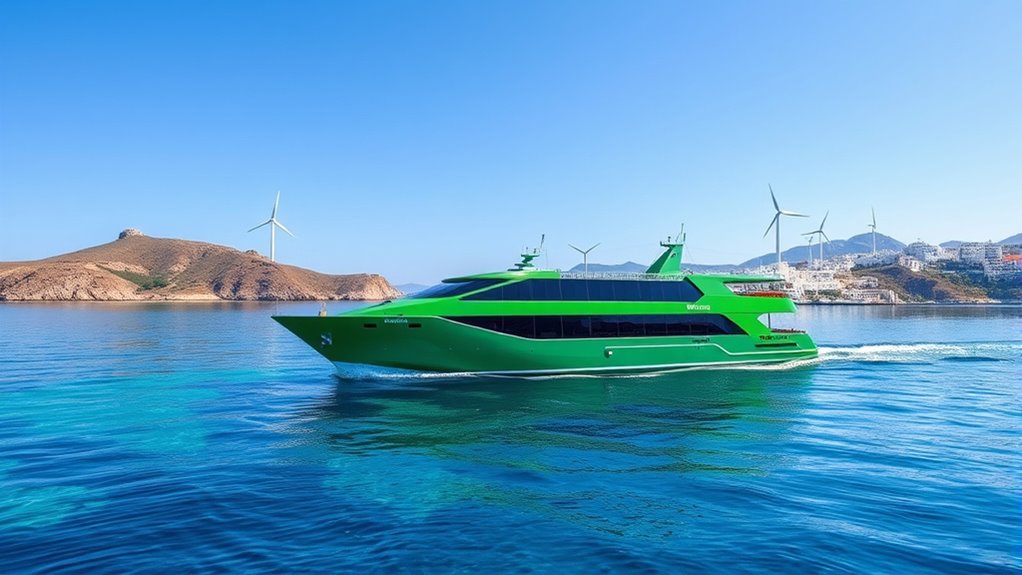
Implementing green ferry systems presents both significant opportunities and notable challenges. Upgrading maritime infrastructure to support zero-emission vessels requires substantial investment and coordination. Ports need to install charging stations, renewable energy sources, and maintenance facilities, which can be costly and time-consuming. Policy incentives play a crucial role in encouraging adoption, offering subsidies, tax breaks, or grants to operators who switch to sustainable options. However, steering regulatory hurdles and securing funding can slow progress. You’ll also face technical challenges, like ensuring battery range and vessel reliability. Despite these obstacles, the opportunity to reduce emissions, improve air quality, and promote sustainable tourism is compelling. With strategic planning, strong policy support, and infrastructure development, you can turn these challenges into a pathway toward a cleaner, greener future for island hopping. Additionally, advancements in sound recording techniques and equipment can support better monitoring and documentation of these projects to ensure transparency and progress tracking. Incorporating digital sound synthesis and innovative audio analysis tools can enhance the tracking of environmental impact and project success. Leveraging AI-powered predictive analytics can also optimize maintenance schedules and operational efficiency, further supporting sustainability goals. Exploring innovative maritime technologies may provide new solutions to overcome existing technical and logistical obstacles, especially as emerging innovations in green propulsion continue to evolve.
Future Outlook: Expanding Zero-Emission Transport Across Greece
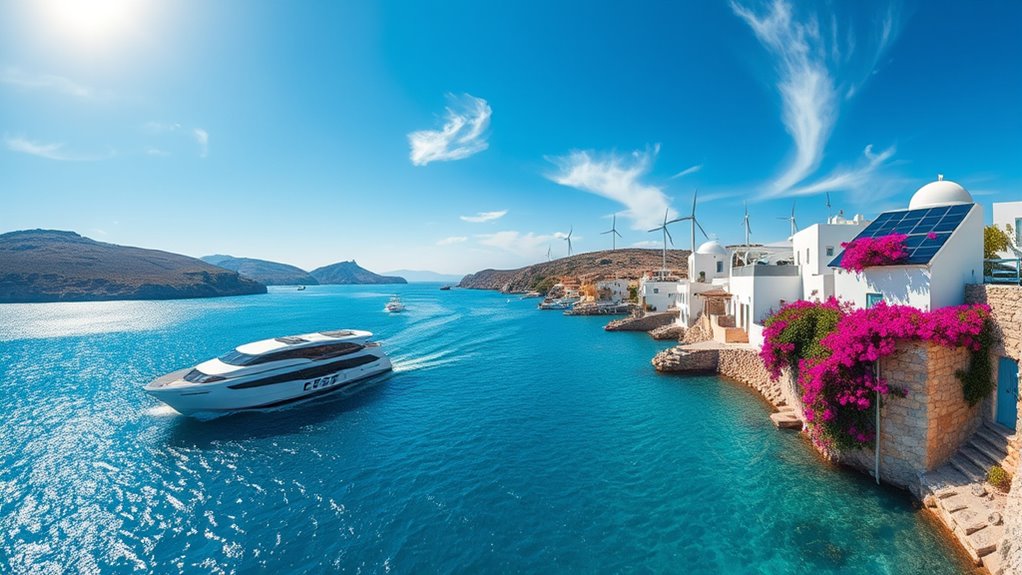
As Greece continues to embrace sustainable transportation, expanding zero-emission ferry services across its islands becomes a promising goal. You can expect a future where renewable energy powers more vessels and infrastructure, reducing reliance on fossil fuels. Policy incentives will play a pivotal role in this shift, encouraging investments and innovation. Here are some key developments to watch for:
- Increased integration of renewable energy sources like solar and wind to power ferries.
- Government subsidies and tax benefits motivating operators to adopt green technologies.
- Expansion of charging and refueling stations across islands, making routes more sustainable.
- Strengthened regulations promoting zero-emission vessels and sustainable practices.
- The adoption of airless paint sprayers concepts in maintenance and infrastructure projects will enhance efficiency and reduce environmental impact. Additionally, advancements in renewable energy storage are crucial for ensuring consistent power supply to zero-emission vessels, especially during high-demand periods. Incorporating energy management systems can further optimize energy use across the network.
- Investing in innovative maintenance technology will further optimize the longevity and performance of green vessels and infrastructure. Incorporating advanced monitoring systems can also help track environmental impact and operational efficiency in real-time.
Together, these steps will help Greece establish a cleaner, greener transport network that benefits both locals and visitors.
Frequently Asked Questions
How Will Zero-Emission Ferries Impact Local Employment in the Cyclades?
You might wonder how zero-emission ferries will affect local employment. These eco-friendly vessels could boost tourism, attracting environmentally conscious travelers and increasing demand for services. They may also create new opportunities for maritime skills, as locals learn to operate and maintain innovative green technology. While some traditional jobs may shift, overall employment could grow, strengthening the region’s economy while promoting sustainable development.
What Funding Sources Support the Transition to Green Maritime Transport?
You can access various funding sources to support green maritime transport, including international grants and investments. These funds often target upgrades in marine infrastructure, making vessels more sustainable. Governments and organizations prioritize eco-friendly projects, helping you reduce emissions and shift seamlessly. By leveraging these resources, you’ll strengthen your maritime infrastructure, promote cleaner energy use, and contribute to global efforts for sustainable transportation.
Are There Plans to Expand Zero-Emission Routes Beyond the Cyclades?
You might wonder if zero-emission routes will expand beyond the Cyclades. Currently, plans focus on developing marine infrastructure and improving tourist perceptions of sustainable travel. If successful, these initiatives could lead to broader adoption across Greece. The goal is to make eco-friendly routes more accessible, encouraging both locals and visitors to support greener maritime options. Such expansion could profoundly reduce carbon emissions and promote sustainable tourism nationwide.
How Do Zero-Emission Vessels Perform in Rough Sea Conditions?
They say “smooth seas never made skillful sailors,” and that’s true for zero-emission vessels in rough waters. You’ll find that these vessels are designed with excellent marine safety and vessel stability features, helping them handle challenging sea conditions better. While they perform reliably, it’s essential to guarantee safety protocols, as even the sturdiest vessels can be tested by rough seas. Proper design ensures safer, more comfortable journeys for passengers and crew alike.
What Training Is Required for Crew Operating New Eco-Friendly Vessels?
You need specialized training to operate new eco-friendly vessels safely. Focus on maritime safety protocols and guarantee your crew obtains proper certification for handling advanced, zero-emission technology. This training covers navigation, emergency procedures, and environmental practices tailored for sustainable vessels. By completing these certifications, you’ll enhance your crew’s skills, ensure compliance, and promote safe, responsible operation in all sea conditions, safeguarding both passengers and the marine environment.
Conclusion
Imagine gliding between the Cyclades on a shimmering, green trail of progress, where clean energy fuels your journey like a gentle breeze. As you embrace this eco-friendly voyage, you become part of a vibrant tapestry weaving sustainability into Greece’s maritime future. With each zero-emission ride, you help turn the island-hopping adventure into a sparkling, sustainable dream—where turquoise waters and clear skies welcome travelers and locals alike into a brighter, greener horizon.





